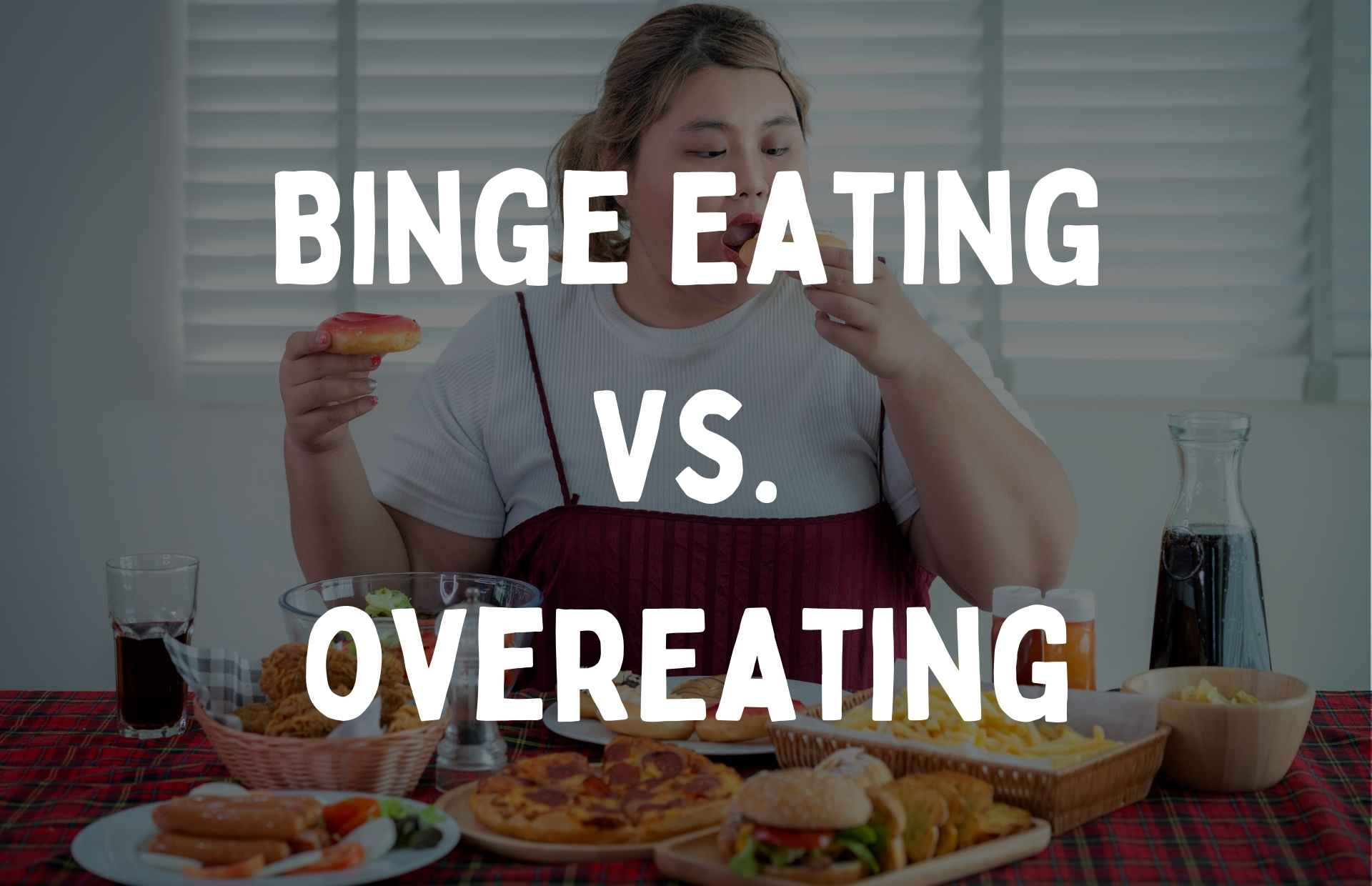

Binge Eating vs Overeating
We?ve all had moments where we?ve indulged in a bit more food than we intended. Maybe it was at a family dinner, a celebration, or even a late-night snack session in front of the TV. However, when does it go from a one-off episode to something more serious?
The terms binge eating and overeating are often used interchangeably, but they refer to two different behaviours. Understanding the difference between the two is crucial for maintaining not just physical health, but mental well-being too.
In this blog post, we?ll break down what binge eating and overeating really mean, how they differ, their impacts on mental health, and strategies to manage each.
What is Overeating?
Overeating is something that happens to everyone. It?s when you consume more food than your body needs, typically in response to certain cues. These cues can be anything from stress to boredom, or even simply because the food in front of you looks too good to resist.
Think about your last holiday dinner or a trip to a buffet where you went back for seconds (or thirds!) even though you were already full.
Characteristics of Overeating
- Occasional: Overeating is usually sporadic and related to specific circumstances. It?s not an everyday occurrence.
- Response to external factors: These could be social situations, availability of food, or emotional cues like stress and boredom.
- No loss of control: Even if you eat more than intended, you don?t feel a complete loss of control over the situation.
- No ongoing distress: Overeating doesn?t usually leave you with a significant emotional burden, though you might feel a bit uncomfortable physically.
While overeating isn?t great for your body when done frequently, it doesn?t typically have the same emotional or psychological consequences as binge eating.
What is Binge Eating?
Binge eating, on the other hand, is a more complex and serious behaviour. It goes beyond just eating too much. People who binge eat feel a loss of control while eating large quantities of food, often in a short time. The emotional fallout from binge eating is also much greater, with feelings of shame, guilt, and distress often following an episode.
Binge eating disorder (BED) is the most common eating disorder in many parts of the world, including the U.S. and Australia, and it can have severe impacts on both mental and physical health. Unlike overeating, which is often tied to specific situations, binge eating can occur frequently and may even become a regular coping mechanism for dealing with difficult emotions.
Characteristics of Binge Eating
- Frequent occurrences: People who binge eat may have episodes multiple times a week, sometimes daily.
- Loss of control: There?s a feeling of being unable to stop eating, even if you want to.
- Emotional distress: Episodes are often followed by intense feelings of shame, guilt, and emotional distress.
- Eating in secret: Individuals who binge eat may hide their behaviour from others, out of embarrassment or shame.
Key Differences Between Binge Eating and Overeating
1. Frequency and Intensity
Overeating is typically a one-off event and doesn?t happen on a regular basis. Binge eating is more frequent and can happen several times a week, sometimes even multiple times in one day.
2. Emotional Impact
Overeating doesn?t generally cause much emotional distress. Binge eating, however, is often linked to feelings of guilt, shame, and embarrassment. The emotional toll is a key factor in distinguishing the two behaviours.
3. Control
Perhaps the biggest difference between binge eating and overeating is the sense of control. When overeating, you may eat more than planned, but you still retain control over your actions. With binge eating, people feel a loss of control and a compulsion to keep eating, even when they don?t want to.

The Impact of Binge Eating on Mental Health
Binge eating doesn?t just affect your body ? it can have a profound impact on your mental health. Many individuals who struggle with binge eating also experience mental health conditions like depression, anxiety, or low self-esteem. The shame and guilt associated with binge eating can lead to a negative self-image and feelings of worthlessness.
In some cases, binge eating is used as a way to cope with difficult emotions. When someone feels stressed, anxious, or sad, they may turn to food as a source of comfort. But while food might provide temporary relief, it often leads to further emotional distress afterward.
Over time, this cycle of emotional eating can become deeply ingrained, making it harder to break free from the behaviour. If left unaddressed, binge eating can exacerbate mental health issues, creating a vicious cycle where the individual feels worse after each episode.
The Impact of Overeating on Mental Health
While overeating doesn?t carry the same psychological weight as binge eating, it can still affect your mental health, especially if it becomes a frequent habit. Regular overeating can lead to weight gain, which may impact self-esteem and body image. This is particularly true in today?s society, where there?s often pressure to maintain a certain body size or shape.
Emotional overeating ? where you turn to food for comfort during stressful times ? can also lead to an unhealthy relationship with food. You may start associating food with comfort and relief rather than nourishment, which can reinforce the cycle of emotional eating over time.
How to Manage Overeating
Overeating is generally easier to manage than binge eating. With a few mindful changes, it?s possible to reduce how often you overeat and regain control over your eating habits.
1. Practice Mindful Eating
One of the best ways to prevent overeating is by practising mindful eating. This means paying attention to your body?s hunger cues and eating when you?re truly hungry, rather than when you?re bored or stressed. Mindful eating also involves eating more slowly and savouring each bite. By doing this, you?re more likely to recognise when you?re full and stop before overeating.
2. Control Portions
When you eat directly from large packages or serve yourself large portions, it?s easy to overeat without realising it. By portioning out your food in advance and serving yourself smaller amounts, you?re more likely to avoid overindulging.
3. Find Healthy Coping Mechanisms
If you notice that you?re eating out of boredom or stress, try to find alternative ways to cope. This could be anything from going for a walk, journaling, or calling a friend. By finding healthier ways to manage your emotions, you?ll be less likely to turn to food for comfort.

How to Manage Binge Eating
Binge eating is more challenging to manage than occasional overeating because it often involves deeply rooted emotional and psychological issues. However, with the right strategies and support, it?s possible to regain control and develop a healthier relationship with food.
1. Seek Professional Help
Because binge eating is a serious disorder, it?s essential to seek professional help. A dietician or nutritionist specialising in eating disorders can help you understand the underlying causes of your binge eating and develop strategies to address them. At The Undiet Co., this is exactly what we specialise in. We help young women to stop binge eating and take back control over food.
2. Develop a Structured But Flexible Eating Plan
One of the first steps in managing binge eating is developing a structured eating plan. This plan should involve eating regular, balanced meals and snacks throughout the day. These balanced meals should also include snacks or meals that provide mental satisfaction. Mental satisfaction from food means honouring your cravings ? even if those cravings are for desserts or 'bad' foods.
By honouring your cravings, keeping your body nourished and avoiding long periods of hunger, you?ll be less likely to feel the urge to binge.
3. Build Emotional Awareness
Since binge eating is often tied to emotional distress, it?s crucial to become more aware of your emotions and how they affect your eating habits. Journaling, mindfulness exercises, or talking to a therapist can help you recognise emotional triggers for binge eating and work through them in a healthy way.
4. Avoid Dieting
While it might seem counterintuitive, strict dieting can actually make binge eating worse. Depriving yourself of certain foods or severely restricting calories often leads to intense cravings and, eventually, a binge. Instead of focusing on weight loss, try to focus on eating balanced, nutritious meals without strict rules or restrictions. Over time, you'll become more attuned to your body's hunger signals, which will naturally allow your body to find its optimal weight.
5. Build a Support System
Having a strong support system is essential when managing binge eating. This can include family, friends, or a support group for people struggling with eating disorders. By sharing your experiences with others, you can gain valuable insights, support, and encouragement to stay on track. In our opinion, the Undiet Community is currently the world's best community for women trying to stop binge eating and build a healthier relationship with food.
The Role of Self-Compassion in Managing Both Overeating and Binge Eating
Whether you?re dealing with occasional overeating or binge eating disorder, one of the most important tools you can use is self-compassion. Many people who struggle with their eating habits are incredibly hard on themselves, viewing each slip-up as a failure. This kind of harsh self-judgment only makes the problem worse by increasing feelings of shame and guilt.
Instead of beating yourself up, try practising self-compassion. Recognise that everyone makes mistakes and that recovery is a journey. Be kind to yourself, and remember that each day is a new opportunity to build a healthier relationship with food.

When to Seek Help
If you find that overeating is becoming a frequent habit or that you?re struggling with binge eating, it?s important to seek help sooner rather than later. Binge eating disorder, in particular, can have serious consequences for both physical and mental health if left untreated.
If you?re unsure whether your eating habits are something to be concerned about, ask yourself the following questions:
- Do I feel a loss of control when eating?
- Do I eat in secret or feel embarrassed about my eating habits?
- Do I often feel guilt or shame after eating?
- Am I eating to cope with emotions like stress, sadness, or boredom?
- Are my eating habits impacting my physical health, weight, or overall well-being?
If you answered 'yes' to any of these questions, it might be time to reach out to a professional dietician or nutritionist for help.
Final Thoughts
Binge eating and overeating are two different behaviours, each with its own set of challenges. While overeating can be managed with mindfulness and healthy coping strategies, binge eating often requires more intensive treatment and support. By understanding the differences between the two, you can take steps to manage your eating habits and improve both your physical and mental well-being.
Remember, whether you?re dealing with occasional overeating or something more serious like binge eating disorder, you?re not alone. Help is available, and with the right strategies and support, it?s possible to break free from unhealthy eating habits and develop a balanced, positive relationship with food.